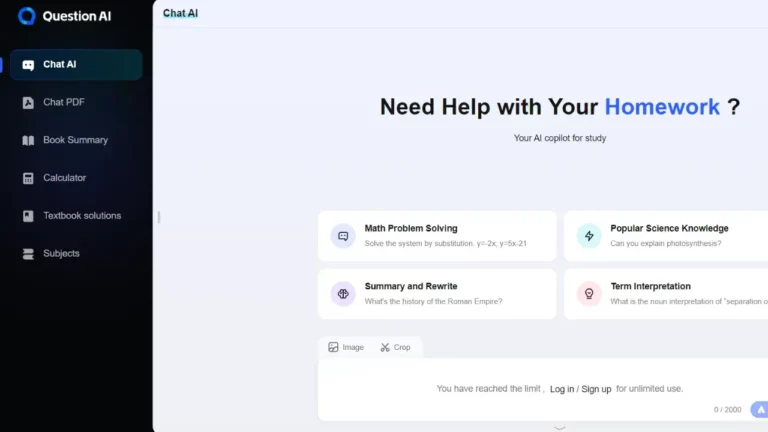Julius AI

Julius AI is a powerful tool that streamlines the analysis of structured data from various sources like spreadsheets, Excel, and CSV files. It offers interactive analysis, advanced analytics, and data animations, saving users time and effort by automating data preparation tasks. Julius’s interface allows visualization and communication of results, and its statistical modeling feature provides expert-level insights without the complexity associated with traditional analyses.
Key Features of Julius AI:
Chat-Based Interaction: Julius AI acts similarly to a chatbot, enabling you to ask inquiries about your data in natural language. This eliminates the need to master advanced data analysis tools or create code.
Data Visualization: Julius AI can produce charts and graphs (including bar charts, heatmaps, and animations) to graphically represent your data. These visuals make it simpler to see trends and patterns.
Advanced Analytics: Don’t be deceived by the user-friendly layout. Julius AI is capable of handling difficult data analysis tasks such as forecasting models and extensive statistical analysis.
Large Dataset Handling: Julius AI is designed to handle vast and complicated datasets, making it a valuable tool for enterprises dealing with considerable volumes of data.
Use Cases For Julius AI Review
Understanding Your Datasets: If you have a dataset but don’t know what it means, Julius AI can help you explore and comprehend it. It may summarize the data, discover patterns, and highlight any irregularities.
Making Visualizations: Data visualizations are excellent tools for communicating data findings. Julius AI can automatically produce several charts and graphs to help you visualize your data.
Creating Machine Learning Models: If you want to utilize your data to generate predictions, Julius AI can assist you in developing simple machine learning models. This is important for activities like projecting revenue or anticipating customer attrition.
Monitoring Key Performance Indicators (KPIs): If you track KPIs to measure your business’s success, Julius AI can help you monitor them and find any trends or areas for improvement.
Identifying Trends and Anomalies: Julius AI can help you uncover patterns and abnormalities in your data. This might be important in understanding what drives your firm and identifying possible challenges.
Pros and Cons of Julius AI:
Pros of Julius AI:
Ease of Use: Julius AI’s chat-based interface makes data analysis easy for novices and non-technical users. You don’t need to know advanced data analysis tools or write code to use them.
Visualization Power: Julius AI may automatically produce several representations to help you rapidly grasp your data. This is particularly useful for folks who prefer visual representations of information.
Advanced Analytics Capabilities: Despite its ease of use, Julius AI can handle sophisticated tasks such as constructing machine learning models and doing extensive statistical analysis.
Large Dataset Friendly: Julius is designed to manage huge and complex datasets, making it a vital tool for enterprises dealing with considerable volumes of data.
Actionable Insights: Julius AI focuses on offering insights you can utilize to make smarter decisions, rather than simply displaying raw facts.
Free Plan Available: Julius AI provides a free plan with a restricted amount of analysis each month, letting you test it before committing.
Cons of Julius AI:
Limited Real-Time Support: Julius AI lacks real-time help, which may be a disadvantage for consumers who want quick assistance.
No API Access: Currently, Julius AI does not provide an API for integration with other tools or programs, which may limit its utility for some users
Limited Third-Party Integrations: While user-friendly, Julius AI may offer fewer third-party plugin connectors than more established data analysis systems.
Black Box Nature: For certain consumers, the lack of transparency regarding how Julius AI reaches its decisions may be a worry.
Limited Functionality in Free Plan: The free plan contains restrictions on the number of studies you can do, which may limit its value for lengthy data investigation.







